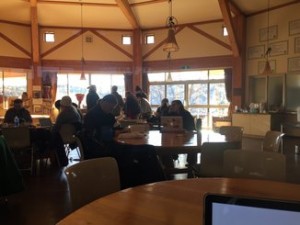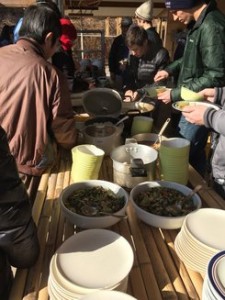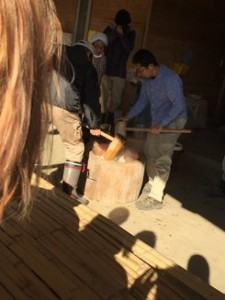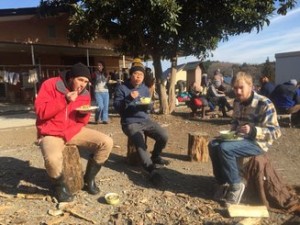We woke up with the sun this Saturday morning to do some community work on the farm. My group’s responsibility was to climb into a pit filled with fermented corn, pass up buckets of the funky-smelling substance, and load it into barrels for relocation. Our shoveling and lifting made us hungry, and we eagerly hiked to the dining hall to share a meal with the community. Another group of community members was preparing a fresh breakfast of pancakes with kiwi jam, hardboiled eggs, rice, and various leftovers from yesterday’s dinner, and everyone else was chatting around circular wooden tables. I spotted an empty seat next to yesterday’s class speaker—Raymond Epp, a farmer from Naganuma with very passionate ideas about globalization and structural violence. Over breakfast, we had a fascinating conversation about how the foods we choose to eat can either support social justice or reinforce structural violence. In this blog post, I want to share this conversation with you and reflect on how it will change my food choices in the United States.

To give you a feeling for the atmosphere of the community dining hall, where I just finished breakfast and am now writing this blog post, here’s a snapshot of the room from my seat.
As I chatted here with Ray, I learned more about Ray’s perspective on modernization. From Ray’s shoes, as a farmer who supports buying local and opposes agribusiness, globalization has created a system that promotes suffering and destruction. In his presentation, Ray summarized his understanding of how our global economic system leads to structural violence via a table of myths and realities about modernization:
Myth:
- Progress
- Assumption that goodness always prevails
- For the benefit of all of humankind
- Nature’s abundance is unlimited
Reality:
- A desacralization of all living things
- Genocide for those who stand in the way of the system
- For the benefit of industrial investors and to a lesser extent the common white man
- Nature’s abundance is stolen on a scale that can never be replaced
Ray’s perspective or modernization resonated with my very core. As a 22-year-old white male studying philosophy at a liberal arts college in the United States, my life is the epitome of privilege. I do not experience the destructive consequences of globalization. Structural violence happens. But it doesn’t happen to me. Children in Bangladesh are forced into slave labor to sew the clothes on my back. I study philosophy at a liberal arts college. Families in Ghana labor in cocoa plantations for far less than the American minimum wage to produce the chocolate in my kitchen. I enjoy watching television after a ‘hard’ day of studying. What makes this okay? Why do we choose to support these industries? How come we never talk about this? These are questions I can’t answer.
It truly shakes one’s world to believe that the foods we choose to eat reinforce such horrendous violations of human rights. Agribusiness is a two-sided coin, and there is no doubt that slavery is not worth the luxury of living on the other side of the coin. Buying a McDonald’s burger or a bag of Hershey’s chocolates is no good in light of violations to the rights of other human beings, the incomprehensible suffering of animals confined in factory farms, and the destruction of the natural environment. At least insofar as agribusiness supports these atrocities, it is painfully clear that agribusiness is a coin we should not choose to spend. But we choose to spend it every day of our lives. Wake up, Greg. Wake up.
I am now confronting what I see as a painful reality: by living as a consumer of agribusiness, I am part of a system that causes suffering and destruction in the world. To me, this realization is a fork in the road, and I have three paths I can choose to take. The first path is a path of ignorance. I can live a lie. I can deny that the food that I purchase causes structural violence, pretending that the chocolate in my kitchen is not actually the product of child slavery. The second path is a path of fatalism. I can believe that my consumer decisions don’t make a difference in the world. Why bother supporting ethically produced food when my friends buy fast food on the regular? I can believe that my food choices won’t make a difference within the system of agribusiness. The third path is a path of awareness. I can realize an alternative road within the system. I can support local farms, and I can live in harmony with the world. Even if I eat a piece of Hershey’s chocolate every now and then, I can commit myself to an alternative lifestyle and stand by my belief in the inherent worth of people and nature.
This is my fork in the road. When I spoke with Ray over breakfast, he described his perspective on the spiritual basis underlying this decision. Indeed, with experience teaching theology, Ray has very colorful ideas about food consumption. He is not only a farmer with developed views on agriculture, but he is also a Christian theologian with views on spirituality and justice.
To Ray’s perspective, we are spiritually enslaved by the global economic system. We live in a world in which the dominant culture of value is aligned to the global economy, and we worship money, efficiency, and competition as Gods. Agribusiness, for example, is motivated not by the betterment of world food production, but by profits. Money, money, money. This system is the origin of why we base our self-worth off of our jobs, and this system is the origin of why we become obsessed with getting better grades or getting that paycheck bonus. The global economic system has created a skewed culture of value that places money over love, efficiency over justice, and competition over cooperation. In this way, only the third path of awareness would be a life of spiritual freedom—only the path of responsible consumerism would express a commitment to love and justice.
This was the second painful reality that I confronted today: I am spiritually enslaved by a skewed culture of value. I am stressed about what job I will have next year, and I worry not because I want to serve others, but because I am trapped in a system that worships work and money. I may now be living in a sustainable farming community in rural Japan, but in America I live in a consumerist society that is dependent on agribusiness and the oppression of the vulnerable. I am embedded in the global economic system, and my values and lifestyle are influenced by its glorification of money over love.
After realizing the great force that globalization and consumerism push onto my identity, I asked Ray for his thoughts on how I can go about navigating a better way of life when I return home to the United States. Ray was very clear in his response. To Ray’s experience, the third path of awareness is the path of spiritual freedom. Even as we live within a system that promotes injustice, we can stand for an alternative lifestyle by supporting local agriculture. As consumers of food, we can live a just, worthy life by becoming aware of the impact of our purchasing decisions and supporting honorable alternatives to agribusiness. Three times each day we have the opportunity to fight for a better world with the food we choose to put on our plate.

A community dinner

Making mochi
In my experience at the Asian Rural Institute, food is more enjoyable when we eat with awareness. Our community collectively prepares each meal from farm to fork, and we are fully connected to the origin of our food. A few nights ago, we made ‘mochi’ together by taking turns pounding rice into paste. I gave the mochi a few whacks, and it was a lot of fun! We celebrated our work by serving the mochi at an outdoor dinner prepared with food grown on the farm. No taste is more satisfying than the taste of a wholesome meal prepared with integrity and enjoyed in good company.

Food in good company

Recent Comments